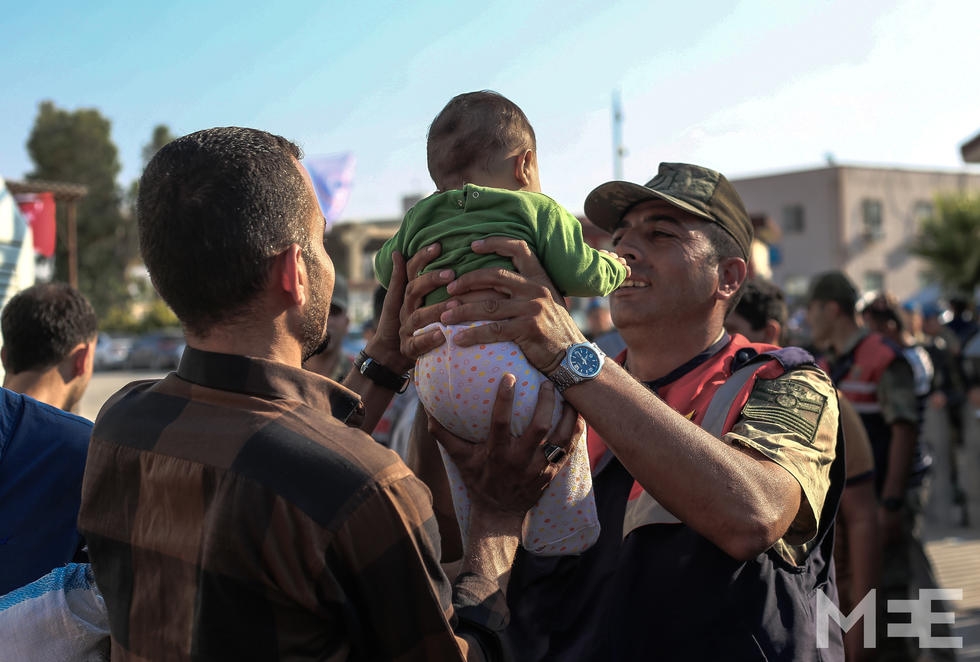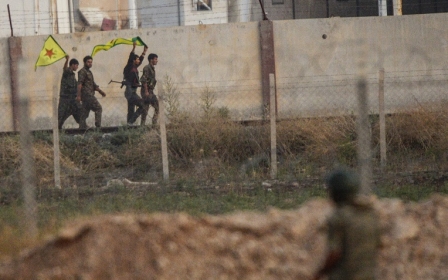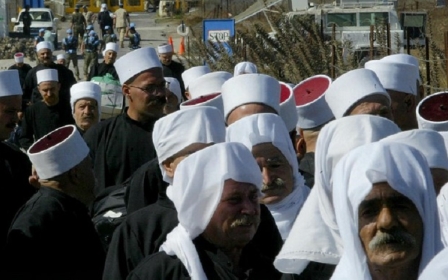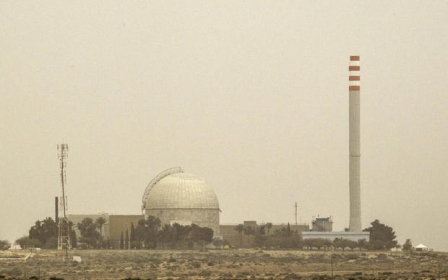Manipulating Syrian suffering

Israeli President Reuven Rivlin last week expressed concern for the welfare of the Druze community in Syria. Had he been genuinely worried for Syrian Druze, he may have also spoken up for those in the Golan Heights who have been under Israeli occupation and colonisation for almost half a century.
That would have been timely given that just three days earlier, security cabinet minister Naftali Bennett urged the international community to recognise Israel's 1981 annexation of the Syrian territory.
This is but one example of the politicisation, opportunism and hypocrisy surrounding expressions of sympathy for Syrians, particularly by leaders, governments and organisations that actively partake in their suffering.
International and regional powers pay lip service to the need for a negotiated solution to the conflict in Syria, and some have been involved in brokering and facilitating talks. However, they simultaneously fuel the conflict militarily, financially and politically.
They base their involvement on the need to stand up for the downtrodden or to tackle terrorism, yet support parties on either side that have committed war crimes and other atrocities. "We protect oppressed people as much as we can," Iranian Supreme Leader Ali Khamenei said last month, while his regime supports a brutal, decades-old dictatorial dynasty in Damascus.
Some deserve freedom more than others
Hezbollah leader Hassan Nasrallah praised the Arab Spring in Tunisia, Egypt, Libya, Yemen and Bahrain, but in his active opposition to the Syrian revolution, he seems to think Syrians are less deserving of the same rights and freedoms that he champions elsewhere in the region. Conversely, the US speaks of freedom for Syrians while denying the very same thing for neighbouring Palestinians in its unflinching support for Israel.
The need for justice and accountability - irrespective of the perpetrator - is paramount to a lasting solution in Syria. However, Russia and China have used their veto powers in the UN Security Council not only to block criticism of the regime - which has committed war crimes and crimes against humanity - but also to block referral of the conflict to the International Criminal Court (ICC), which would investigate abuses by all sides.
The referral would have sent "an important message that... horrific crimes cannot be committed with impunity," said Amnesty International. "A crucial opportunity for justice has been squandered. Once again, Russia and China have abandoned the Syrian people for the sake of salvaging political alliances." The vetoes by Moscow and Beijing indicate their awareness that their ally in Damascus would not fare well in the dock.
All foreign parties to the conflict stress the need for Syrians to determine their own future. However, they themselves are either autocratic, or prop up dictatorship in Syria or elsewhere in the region, or support Syrian Islamist rebel groups that reject democracy.
Outrage, but no refuge
Governments worldwide express shock and outrage at the suffering of the Syrian people and the scale of the refugee crisis, with more than 3 million fleeing the country and some 6.5 million internally displaced. However, most of those governments - some of them significantly involved in the conflict - have closed their doors to those refugees.
Amnesty International said in December that "the world's pitiful response" to the refugee crisis has had "disastrous consequences". The Gulf states, "which include some of the world's wealthiest countries," have "not offered to take a single refugee from Syria so far”.
The report also stated that "Russia and China have similarly failed to pledge a single resettlement place. Excluding Germany, the rest of the European Union (EU) has pledged to resettle a paltry 0.17 percent of refugees in the main host countries."
In March, The Guardian reported: "So far, the US has accepted only tiny numbers of Syrians: 105 in the year to October 2014 and just 36 in the year before that, although it has stepped up admissions with 350 refugees in the past four months."
There is a pervasive problem of “what-about-ism” over Syria, whereby those on either side of the conflict highlight abuses by those they oppose, while turning a blind eye or excusing their own side's abuses.
For example, I have witnessed Syrians from Aleppo quite understandably lament the destruction of their home city, while cursing at the TV during footage of barrel-bombings there - not directed at the regime for carrying out the bombings, but at the TV station for airing them.
The enemy of my enemy
On the other hand, there are those who are willing to accept jihadist groups simply because they are fighting both the regime - and by extension Iran and Hezbollah - and the Islamic State (IS). This is a stark example of "the enemy of my enemy is my friend". Those outside Syria would find this thinking far easier to embrace than those inside the country who would have to live with the consequences.
Despite Syria's diverse social fabric, such groups seek to establish an Islamic emirate under sharia law, and view the country's sizable minorities including non-Sunni sects of Islam, with varying degrees of suspicion or hostility.
Last month, Abu Mohammad al-Golani, leader of al-Qaeda's Syrian affiliate Jabhat al-Nusra, said members of the Alawite community, from which Bashar al-Assad hails, would be "our brothers" if they "return to Islam" - how magnanimous.
The solution for Syria cannot be to replace one form of tyranny with another. Simply toppling the regime is not the fulfilment of the revolution - post-war Syria must be a pluralistic democracy where human rights and freedoms are universally respected.
This will only happen through reconciliation and cooperation, not double standards, crocodile tears or selective moral outrage. While all involved parties enthusiastically play the blame game, they have - to varying extents and in different ways - failed the Syrian people.
- Sharif Nashashibi is an award-winning journalist and analyst on Arab affairs. He is a regular contributor to Al Arabiya News, Al Jazeera English, The National and The Middle East magazine. In 2008, he received an award from the International Media Council "for both facilitating and producing consistently balanced reporting" on the Middle East.
The views expressed in this article belong to the author and do not necessarily reflect the editorial policy of Middle East Eye.
Photo: A Turkish soldier holds an infant who is with a group of Syrian refugees who have fled to the Turkish border to escape fighting as Kurdish forces advance to the outskirts of the Syrian town of Tal Abyad (MEE/Ibrahim Khader)
New MEE newsletter: Jerusalem Dispatch
Sign up to get the latest insights and analysis on Israel-Palestine, alongside Turkey Unpacked and other MEE newsletters
Middle East Eye delivers independent and unrivalled coverage and analysis of the Middle East, North Africa and beyond. To learn more about republishing this content and the associated fees, please fill out this form. More about MEE can be found here.





